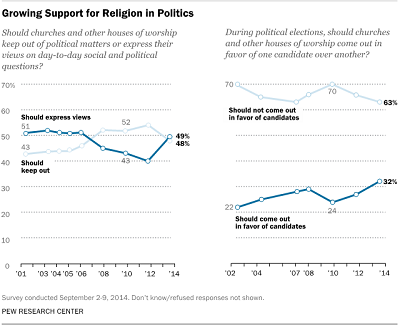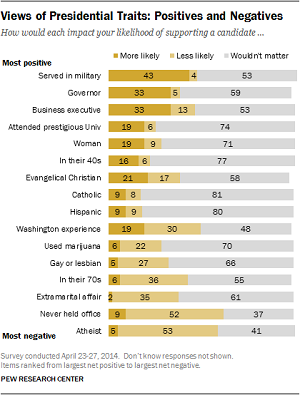Weekly Demographic Research and Polls Report
by Deanna Cantrell

Sanders-021507-18335- 0004
With US Democratic Presidential Candidate, Bernie Sanders, expressing his personal views on religion recently there has been a buzz of speculation.  He did this during an interview in an unexpected forum, The Jimmy Kimmel Show, a late night talk show.  Sanders did not come out as a nontheist, he sidestepped giving a direct answer.
ÔÇ£I am who I am and what I believe in and what my spirituality is about is that weÔÇÖre all in this together. That I think it is not a good thing to believe that as human beings we can turn our backs on the suffering of other people,ÔÇØ Sanders said. ÔÇ£This is not Judaism ÔÇö this is what Pope Francis is talking about ÔÇö that we cannot worship just billionaires and the making of more and more money. Life is more than that.ÔÇØ
The U.S. is supposed to be a secular nation, so why is a candidateÔÇÖs religious affiliationÔÇöor lack thereofÔÇöhold such an importance among American voters?┬á The reason for SandersÔÇÖ reply could, objectively, be that he already states that he is a Socialist.┬á ┬áAccording to a Gallup poll, As the 2016 presidential election field takes shape, more than nine in 10 Americans say they would vote for a qualified presidential candidate who is Catholic, a woman, black, Hispanic or Jewish. Less than half of Americans would vote for a candidate who is a socialist.┬á Adding in nontheist, regardless of SandersÔÇÖ personal beliefs, could be seen as political suicide.
In seven U.S. states, there are laws on the books outlawing godless Americans from running for public office.┬á These states include:┬á Arkansas, Maryland, Mississippi, North Carolina, South Carolina, Tennessee and Texas.┬á Obviously, these laws are trumped by the ÔÇ£No Religious Test ClauseÔÇØ of the United States Constitution, which is found in Article VI, paragraph 3, and states that:
The Senators and Representatives before mentioned, and the Members of the several State Legislatures, and all executive and judicial Officers, both of the United States and of the several States, shall be bound by Oath or Affirmation, to support this Constitution; but no religious test shall ever be required as a qualification to any office or public trust under the United States.
 List of State Statutes 
List of State Statutes 
- Arkansas, Article 19, Section 1:
No person who denies the being of a God shall hold any office in the civil departments of this State, nor be competent to testify as a witness in any Court. - Maryland, Article 37:
That no religious test ought ever to be required as a qualification for any office of profit or trust in this State, other than a declaration of belief in the existence of God; nor shall the Legislature prescribe any other oath of office than the oath prescribed by this Constitution. - Mississippi, Article 14, Section 265:
No person who denies the existence of a Supreme Being shall hold any office in this state. - North Carolina, Article 6, Section 8
The following persons shall be disqualified for office: Any person who shall deny the being of Almighty God. - South Carolina, Article 17, Section 4:
No person who denies the existence of a Supreme Being shall hold any office under this Constitution. - Tennessee, Article 9, Section 2:
No person who denies the being of God, or a future state of rewards and punishments, shall hold any office in the civil department of this state. - Texas, Article 1, Section 4:
No religious test shall ever be required as a qualification to any office, or public trust, in this State; nor shall anyone be excluded from holding office on account of his religious sentiments, provided he acknowledge the existence of a Supreme Being.
 Favorable traits leading the pack for a politician are shown, by poll, to be military experience and past political experience.  On the other side of the ledger, not believing in God and never having held elected office before are the most negatively viewed traits of those tested. Just over half (53%) say they would be less likely to vote for someone who does not believe in God, while only 5% say this would make them more likely to support a candidate. And despite a decline in regard for extensive Washington experience, a presidential candidate who has never held any elected office would have little appeal: 52% say this would make them less likely to vote for a candidate compared with just 9% who say this would increase their likelihood of supporting a candidate.
Favorable traits leading the pack for a politician are shown, by poll, to be military experience and past political experience.  On the other side of the ledger, not believing in God and never having held elected office before are the most negatively viewed traits of those tested. Just over half (53%) say they would be less likely to vote for someone who does not believe in God, while only 5% say this would make them more likely to support a candidate. And despite a decline in regard for extensive Washington experience, a presidential candidate who has never held any elected office would have little appeal: 52% say this would make them less likely to vote for a candidate compared with just 9% who say this would increase their likelihood of supporting a candidate.
Would Bernie Sanders survive the primary and secure a place as the Democratic candidate if he were, in fact, a nontheist and was clear and outspoken about it?  The polls do not look promising for that possibility.  All we can do is sit and wait to see how this plays out over the course of the campaign.
